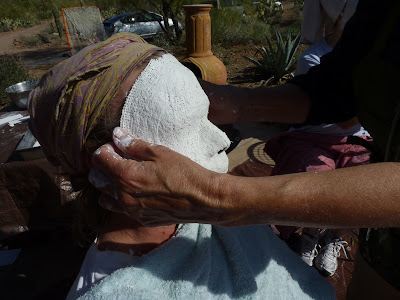The TRANSFORMATIVE MASK
Working with Masks and Myth
"Our work was not to re-enact the ancient myths, but to take those myths to their next level of evolutionary unfolding. Artists are the myth makers."
Katherine Josten, Founder, THE GLOBAL ART PROJECT
Every mask is the beginning of a story, because each mask is inhabited by a being waiting to reveal itself, whether a universally recognizable archetype, or an eccentric, very personal inner persona that can communicate in surprising ways. Masks can heal by speaking with a voice that we can't, and masks can provide an opportunity for transpersonal experience as well, when we engage with sacred and universal archetypes. In traditional cultures, such as Bali, sacred masks were viewed as a means for the divine - the gods, goddesses, ancestors and animal powers - to bless the living through ritual theatre.
Making a mask is a process, but it's only part of the process - those who will use the mask complete the journey. And because the "spirits of the masks" come from the Mythic Realm, there is really no end to the journey at all. Just a circle of new telling.
 In my workshops, we learn to sculpt a theatrical mask from our faces, explore personally significant stories and symbols, and learn approaches to storytelling with masks, with discussion about community performance and ritual theatre. I've found it's best to "invite the spirit of the mask" by beginning with a shared "Shrine". Participants bring objects that are personally sacred and meaningful. Our "Invocation" is sometimes a creative visualization exercise. After we've created a "Circle" to work in, we "get plastered" in pairs as we take casts of our faces with plaster impregnated bandages. These will become plaster positives on which more durable leather masks can be then modelled.
In my workshops, we learn to sculpt a theatrical mask from our faces, explore personally significant stories and symbols, and learn approaches to storytelling with masks, with discussion about community performance and ritual theatre. I've found it's best to "invite the spirit of the mask" by beginning with a shared "Shrine". Participants bring objects that are personally sacred and meaningful. Our "Invocation" is sometimes a creative visualization exercise. After we've created a "Circle" to work in, we "get plastered" in pairs as we take casts of our faces with plaster impregnated bandages. These will become plaster positives on which more durable leather masks can be then modelled.
Plaster casts can also be used to create masks and sculpture from clay and other media. See below for a few examples from other students.
 |
| Preparing materials |
With gratitude to Nancy Solomon for the kind use of her photographs (copyright N.Solomon 2010)
|
|
 In my workshops, we learn to sculpt a theatrical mask from our faces, explore personally significant stories and symbols, and learn approaches to storytelling with masks, with discussion about community performance and ritual theatre. I've found it's best to "invite the spirit of the mask" by beginning with a shared "Shrine". Participants bring objects that are personally sacred and meaningful. Our "Invocation" is sometimes a creative visualization exercise. After we've created a "Circle" to work in, we "get plastered" in pairs as we take casts of our faces with plaster impregnated bandages. These will become plaster positives on which more durable leather masks can be then modelled.
In my workshops, we learn to sculpt a theatrical mask from our faces, explore personally significant stories and symbols, and learn approaches to storytelling with masks, with discussion about community performance and ritual theatre. I've found it's best to "invite the spirit of the mask" by beginning with a shared "Shrine". Participants bring objects that are personally sacred and meaningful. Our "Invocation" is sometimes a creative visualization exercise. After we've created a "Circle" to work in, we "get plastered" in pairs as we take casts of our faces with plaster impregnated bandages. These will become plaster positives on which more durable leather masks can be then modelled. 











